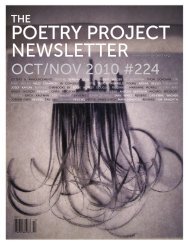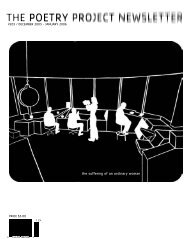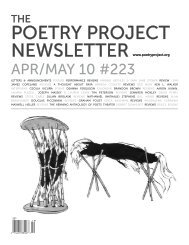Download PDF - The Poetry Project
Download PDF - The Poetry Project
Download PDF - The Poetry Project
You also want an ePaper? Increase the reach of your titles
YUMPU automatically turns print PDFs into web optimized ePapers that Google loves.
THE POETRY PROJECT NEWSLETTER<br />
31<br />
BOOK REVIEWS<br />
All I have is my life, which I promptly stake every<br />
time a difficulty appears. <strong>The</strong>n it is easy to<br />
dance, for the thought of death is a good dancing<br />
partner, my dancing partner. Every human<br />
being is too heavy for me, and therefore I plead:<br />
Let no one invite me, for I do not dance.<br />
And this is the memorial verse that kicks-off<br />
section one, “<strong>The</strong> Red Pearl”:<br />
what must go goes what stops stops with—<br />
water way lake poverty—held clear<br />
water sparkle air pump daily<br />
from bottom daily naked oblations to master<br />
accident—be my means facing stop<br />
water eyes woods to sheer words can’t adhere<br />
water goes goes with stops stops with go—<br />
What must go is life, like water. What stops is<br />
death, the “master accident.” Newman notices<br />
that life is one perceptual, phenomenological,<br />
psychological and social accident after another;<br />
unpredictable, uncontrollable, beyond human<br />
agency. Accepting this vulnerability is accepting<br />
a god, a force greater than us, a sort of classical<br />
greek god one can actually work with,<br />
instead of sheer human avoidance, pretending<br />
you know what you’re doing, the distinctively<br />
human pretense that you know what is happening,<br />
or going to happen, at any given moment.<br />
Newman asks, what is my vehicle for this trip<br />
What is the meaning of it And how is life meaningful,<br />
not merely empty or absurd, if there is<br />
no God As a Zen teacher recently pointed out,<br />
one doesn’t really transcend anything in this life,<br />
that’s a cop-out, a betrayal.<br />
in the vigorous bloomtime<br />
bring it on, struggle to be<br />
peaceful in one’s rod, rule, nonstop go—<br />
that is, time, and how the older ones lean on it<br />
<strong>The</strong> second section is called “I Went Out New,”<br />
as in the heuristic practice of accident. From the<br />
start of the first poem, entitled “<strong>The</strong> First Rip”:<br />
then I went out new in my accident to see<br />
if humankind looked new<br />
and it did<br />
looking up at people moving freely above the station<br />
each living thing influential in its ability to move freely<br />
along more or less the same lines<br />
not that I was new but I was shiny and well tuned<br />
with a new buoyancy limb, that is, my accident,<br />
which hasn’t happened but I know it<br />
on instinct as I once was my animal,<br />
animate, breath in that way . . .<br />
In the penultimate section, “<strong>The</strong> Silences,”<br />
Newman uses a funny conversational jag about<br />
the false consciousness of “a total managed reality”<br />
in our dance with death. She introduces a<br />
character named BLANCO (blank, void, death).<br />
She wants to dance with him, but shit that he<br />
is, he refuses. <strong>The</strong> final poem in the series is<br />
“<strong>The</strong> Divine Naming.” <strong>The</strong> poet’s vehicle is, ultimately,<br />
language, the naming of things, fears,<br />
emotions, loves and hates, plus all sorts of<br />
weird images seen with the eyes and the heartbody;<br />
felt, heard, seen out in the “real” world,<br />
with its common ordinary speech:<br />
when we call it “song” or “life” or “light” or<br />
“accident”<br />
when we call it “mystery” or “misty” or “palace”<br />
“overabounding”<br />
we’re actually saying “in a manner of speaking” or<br />
“count me in”<br />
in other words,<br />
to say is to divine. . . .<br />
Who is saying all this Who’s there actually<br />
wobble said<br />
water said<br />
dark said<br />
and all things said in this vein<br />
i’m of time<br />
awe of wave<br />
if of life<br />
and all things said in this vein.<br />
Newman has moved beyond the uncertain<br />
structure and prosody of her first two poetry<br />
collections Human Forest (Apogee, 2000) and<br />
Wild Goods (Apogee, 2008), and landed in a<br />
solid and admirable clarity. It is at base, I think,<br />
an existential and phenomenological clarity,<br />
comfortable with her selfhood in the complexly<br />
gendered San Francisco cityscape.<br />
Brian Unger is a doctoral student in American<br />
Literature at the CUNY Graduate Center and editor<br />
of Zen Monster.<br />
STRAW<br />
GATE<br />
David Mills, <strong>The</strong> Dream Detective<br />
and Lydia CORTÉS, Tom SAVAGE,<br />
Stephanie GRAY, Bill KUSHNER,<br />
Valerie FOX<br />
leafscape.org/StrawGateBooks
















